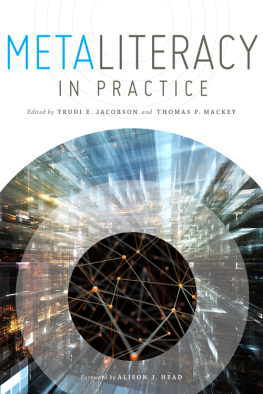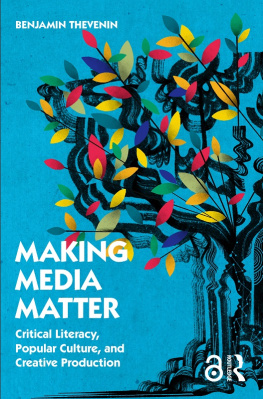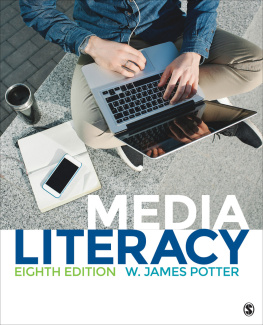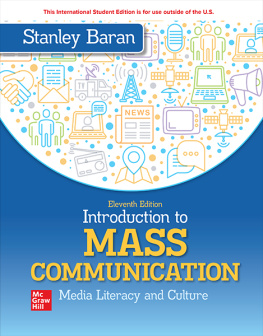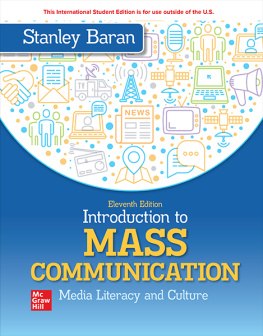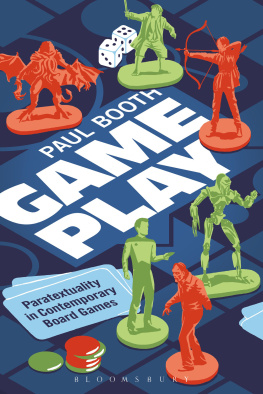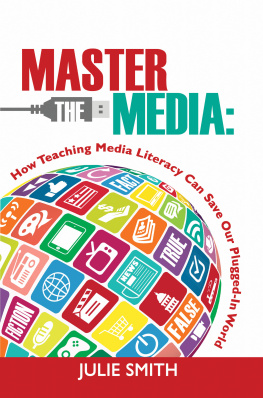MEDIA
LITERACY in the
INFORMATION
AGE
Current Perspectives
INFORMATION AND BEHAVIOR, VOLUME SIX
Information and Behavior Series
Brent D. Ruben, Series Editor
Volume 1
Information and Behavior,
edited by Brent D. Ruben
Volume 2
Information and Behavior,
edited by Brent D. Ruben
Volume 3
Mediation, Information, and Communication,
edited by Brent D. Ruben and Leah A. Lievrouw
Volume 4
Between Communication and Information,
edited by Jorge R. Schement and Brent D. Ruben
Volume 5
Interaction and Identity,
edited by Harmut B. Mokros
Volume 6
Media Literacy in the Information Age,
edited by Robert Kubey
Robert Kubey
EDITOR
MEDIA
LITERACY in the
INFORMATION
AGE
Current Perspectives
INFORMATION AND BEHAVIOR, VOLUME SIX
First published 1997 by Transaction Publishers
Published 2017 by Routledge
2 Park Square, Milton Park, Abingdon, Oxon OX14 4RN
711 Third Avenue, New York, NY 10017, USA
Routledge is an imprint of the Taylor & Francis Group, an informa business
Copyright 1997 by Taylor & Francis.
All rights reserved. No part of this book may be reprinted or reproduced or utilised in any form or by any electronic, mechanical, or other means, now known or hereafter invented, including photocopying and recording, or in any information storage or retrieval system, without permission in writing from the publishers.
Notice:
Product or corporate names may be trademarks or registered trademarks, and are used only for identification and explanation without intent to infringe.
ISSN: 0740-5502
ISBN 13:978-1-56000-238-3 (hbk)
Contents
Brent D. Ruben
Introduction
Media Education: Portraits of an Evolving Field
Robert Kubey
Len Masterman
Cary Bazalgette
Patricia Aufderheide
Jacques Piette and Luc Giroux
Paul Messaris
Renee Hobbs
Peter Greenaway
Andrew Hart
Dafna Lemish and Peter Lemish
Costas Criticos
David M. Considine
Mire Messenger Davies
David Buckingham and Julian Sefton-Green
Robyn Quin and Barrie McMahon
Roger Desmond
Tamar Liebes
W. Lambert Gardiner
Micheline Frenette
Charles R. McClure
Carol C. Kuhlthau
Tamar Katriel
No book is a solo effort, especially an edited volume with over twenty-five contributing authors. My thanks go to each of the authors who worked often at great distance, under less than ideal conditions, and with considerable patience.
I wish also to express my deep appreciation to the Annenberg Scholars Program at the Annenberg School for Communication at the University of Pennsylvania. The program, in its first year when I was a fellow, afforded five scholars a half-year to focus on individual research problems in media education.
Some of the work that appears in this volume, the chapters by Mire Messenger Davies, Roger Desmond, Tamar Liebes, and Dafna Lemish, was completed while we were Annenberg Scholars. Without the support of the Annenberg School I would not have been able to travel as widely as I did and meet with as many of the authors who have contributed chapters. While we were at Annenberg, Dean Kathleen Hall Jamieson, Professor Elihu Katz, who directs the Scholars Program, and the faculty, students, and staff of the school made for an incomparable period of study for each of us.
Thank you also to Bill White, the books assistant editor, who helped me go over manuscripts in the early phase of the books development.
At Transaction, Laurence Mintz helped shepherd this work, and Lynn Guarente did a quick and thorough job of copyediting once the manuscript was placed in her capable hands.
I am also grateful to Dean Richard Budd and Professor Linda Lederman, who have supported my work and have helped carry out the commitment of Rutgers School of Communication, Information, and Library Studies to the Information and Behavior series. Thanks also to Richard McGuire for an expert job of indexing the book, and to the faculty and staff of the Department of Communication at Stanford University, who made me feel at home as I completed the editing while on sabbatical as a Visiting Professor.
Most importantly, I wish to acknowledge the constant support of Professor Brent Ruben, series editor of Information and Behavior.
This book would not exist were it not for Brent Ruben. Brent had the original idea for a book on the broad topic of literacy in the information age, and we originally planned to edit it together. But as Brent took on the important and formidable assignment to found and direct Rutgers new university-wide program in Quality and Communication Improvement, the work on the book became mine and more focused on media education. Still, Brent contributed in supporting my efforts and in taking care of procedural problems that always come up in an undertaking such as this.
I wish to thank my wife, Barbara, as usual, for her constant support, patience, and wise counsel. And thanks to Benjamin for letting me work on this book when he wanted me to help him build a model and watch his favorite TV program, Rescue 911.
Finally, a special thank-you to Daniel for accurately distinguishing between the papers on Daddys desk and all other papers, books, periodicals, rugs, drapes, tables, and windows that he is accustomed to so creatively marking up with his crayons. Both of these young colleagues help me appreciate on an hourly basis the media education proviso that we must all learn to decode, evaluate, analyze, and produce both print and electronic media.
Brent D. Ruben
The Information and Behavior series was born in 1983 at a time when one could be only partially aware of the importance that the information-behavior relationship would come to have in the years ahead. At that time, the expressions, the information age and the information society were beginning to find popular acceptance, and were typically used as catch-phrases to refer to the contemporary, post-modern, high-technology period. It was the view of the series editor and the editorial board that beyond the newly-found words and phrases there were important issues of substance that would increasingly occupy the attention of scholars from a wide range of fields.
The significance of the concept of information and its relationship to human behavior was clearly not a novel idea in 1983. As was noted in the introduction to Information and Behavior: Volume 1 the processing of information had been described as one of two primary means through which living organisms interact with their physical and social environments. Moreover, information and information processes were seen as basic to higher-level cognitive processes in humans. It was indicated also that information and information processes were understood to be fundamental at the interpersonal, social, and cultural level of analysis, and basic to the establishment and maintenance of relationships, groups, organizations and societies, and to the cultures, and normative realities, rules, and roles of each. Finally, it was observed that information is a fundamental concept in generic theories in system theory, cybernetics, information theory, and in disciplines such as communication, media studies, information science, computer science and cognitive psychology pointed in the direction of heightening interdisciplinary interest and significance for the information concept.




